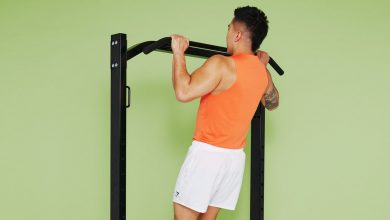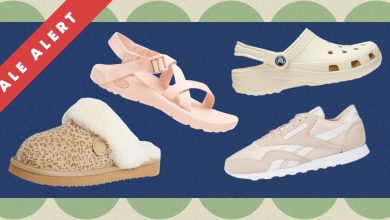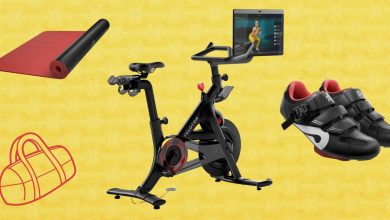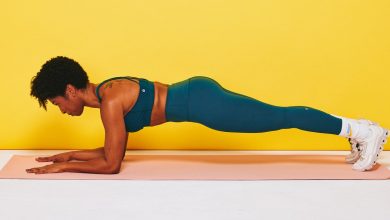Exercise Might Be the Natural Sleep Aid You’re Seriously Overlooking
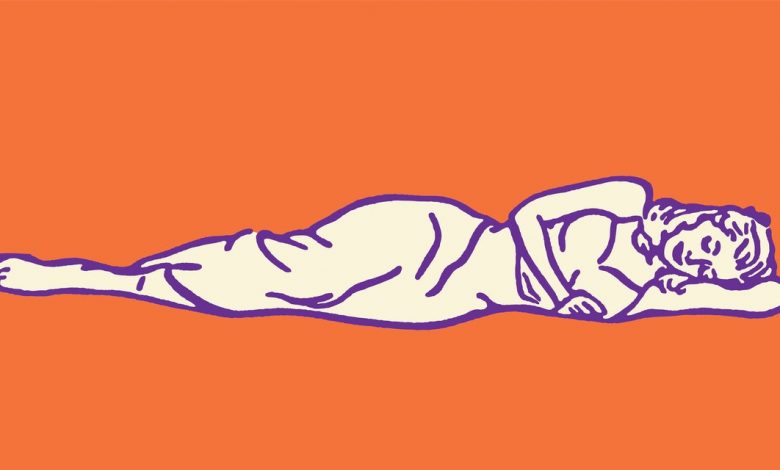
All products are independently selected by our editors. If you buy something, we may earn an affiliate commission.
By now, it’s one of the most commonly cited wellness stats out there: Sleep at least seven hours a night if you want to feel your best. But if you find yourself tossing and turning, you know all too well that getting to bed on time doesn’t always guarantee those hours will add up to restful slumber—even if you’ve tried every fall-asleep-fast hack out there, from blue-light glasses to relaxing bedtime routines.
But there’s another promising lifestyle habit that might help you conk out: exercise. While the fact that sleep benefits athletic performance is already well documented, evidence is also adding up that moving more—both as a single session and a regular practice—can improve your rest, making the two represent quite the virtuous two-way cycle. In fact, you may fall asleep faster, stay asleep longer, and sleep more deeply on the days when you work out, according to a 2015 meta-analysis published in the Journal of Behavioral Medicine. And all in all, exercise may just be a safe way to improve sleep for everyone, from pregnant people to older adults, a separate review concluded.
Want to make the most of your movement and your shuteye? Here’s what you need to know—and the best ways to put it all into practice.
There are a few reasons why working out might help you sleep.
Just as doctors aren’t really sure why some people toss and turn in the first place, they don’t definitively know why exercise helps the whole sleep process along. But they do have some solid theories that can help us understand what might be going on there.
For one, we know that people with anxiety and depression tend to report worse sleep—and we also have learned that physical activity can relieve some of those symptoms. So it makes sense that exercise might improve slumber by boosting mood, though there hasn’t yet been a definitive study to connect those dots, Christopher Kline, PhD, an associate professor at the University of Pittsburgh who’s extensively researched sleep and exercise, tells SELF.
Even a single workout might encourage your immune system to better balance out your cytokines, proteins that influence inflammation levels and may also help you sleep, he says. And over time, the benefits can add up.
Another factor Dr. Kline is studying involves temperature regulation. An hour or two before you fall asleep, your body temperature begins to decline, helping you to drift off. Many people with insomnia also have trouble adjusting their temperature, possibly because the part of your brain that regulates sleep-wake cycles is next to the one that controls thermoregulation, Dr. Kline says.
As anyone who’s sweated through a run, Pilates class, or strength routine can tell you, exercise heats you up. But it’s what comes after that’s key to solid sleep: “Once you stop exercising, the body has to find a way to get rid of that extra heat,” Dr. Kline says; it does this by dilating the blood vessels in your hands and feet so blood can get to your skin’s surface to cool. As a result, that single workout can lower your body temperature in the hours that follow, helping you sleep that evening.
The kicker? Over time, the cycle of efficiently heating up and cooling down may train your body to better adjust its internal thermostat, improving sleep even on days when you don’t work out, he says.
Finally, it’s also possible that the routine of exercise may play a role in shaping your habits and your circadian rhythm, the internal body clock that helps determine when you sleep and wake, Sara E. Benjamin, MD, medical director of the Johns Hopkins Center for Sleep and Wellness, tells SELF. As an early-morning exerciser, she’s experienced this in her own life: “The default for me is to roll out of bed and put on exercise clothes,” she says. “Getting up early to exercise before work means that I need to go to sleep early, so I structure my life as much as possible to allow for this.”
That means she says no to many evening meetings, limits computer time after dinner, and dims the lights in the bedroom as she winds down for the evening. All these steps regulate her circadian rhythms and promote restful slumber. It’s an approach that could work for others, too, she says: “If people make a habit of early morning exercise and that becomes the routine, it may help them to consistently fall asleep earlier than they would without that routine.”
If you have certain sleep disorders, there are even more reasons to try movement.
Some cases of insomnia do have specific causes—many of which seem to respond to physical activity. Take restless legs syndrome, which causes an often uncontrollable urge to move your lower extremities. Symptoms often worsen in the evening and can affect sleep, Dr. Benjamin says.
If you’re in that boat, cardio like walking or cycling may work as an alternative to medication. “People with restless legs tend to do best with a moderate, consistent exercise routine,” she says. “They will tell me that RLS is worse if they don’t exercise at all or when they overdo it one day.”
Another condition that exercise seems to improve is sleep apnea, which occurs when you stop breathing during sleep. Sleep apnea makes your nights less restful and your days drowsier, and can also lead to problems like heart failure, arrhythmias, and type 2 diabetes.
People who followed a 12-week program based on government guidelines for exercise (150 minutes of moderate-intensity cardio a week, plus two days of strength training) lessened their sleep apnea severity by about 25%, according to a clinical trial Dr. Kline and his colleagues published in the journal Sleep in 2011. And in a follow-up published last year, folks who did three weekly high-intensity workouts cut their number of shallow or stopped breaths by an average of nine per hour.
Important note: While doctors often recommend weight loss as a treatment for sleep apnea, these studies showed no change in weight and still found that exercise reduced symptoms. Divorcing exercise from its weight loss implications helped many people in the studies form a more positive relationship with moving their bodies, Dr. Kline says.
There’s no one way to exercise for better sleep.
Right now, docs don’t yet know the exact amount and type of exercise that’s best if you want to sleep like a baby.
In general, aiming for the government guidelines is a worthwhile goal if you want to reap many of the health benefits of exercise, including better sleep, Dr. Kline says. But don’t stress if that feels like a lot: It’s likely that smaller amounts help, too. More research is needed—some of which is already underway—on whether simply being less sedentary improves sleep, as well as whether shorter or less frequent workouts can still have a positive effect.
It’s also a case of where more doesn’t equal better, either. It’s clear that there’s also a point of diminishing returns, Dr. Kline says. Disturbed sleep is one symptom of overtraining, so if you’re pushing your body too hard or ramping up your activity level too quickly, it can backfire when it comes to rest and recovery.
As for what types of workouts are best, the answer might just be: whichever you like! While many of the studies have focused on aerobic activities like walking and cycling, a 2018 review that looked at 13 studies featuring resistance training also found benefits of that for sleep quality. And mind-body forms of movement like yoga, qigong, and Tai chi also show promise.
When you do them probably matters, too. As SELF reported previously, the research on whether exercising at night can mess with sleep isn’t definitive, but there’s some evidence that intense workouts that end less than an hour before bed can indeed keep you up longer, perhaps by keeping your heart rate elevated or not allowing you to cool down quickly enough. So if late workouts are your only (or preferred) option and you have trouble sleeping afterward, you might want to try taking the intensity down a notch.
Also, make note of other factors around your workout that might make a difference—for example, light, which strongly influences circadian rhythms. Exercising in a well-lit gym at night could disrupt sleep, Dr. Benjamin says. Meanwhile, getting outdoors for a morning workout could make you drowsier at night, since exposure to sunlight first thing can keep your body clock better aligned.
And then there are the specific nuances that apply to your own body and lifestyle. “It can be trial and error for everyone to figure out how the timing and intensity of exercise affect their sleep,” she says. “Some gentle movements close to bedtime may be helpful, for example, if someone has a tight back. They may find that a gentle stretching or yoga routine helps them to sleep longer before their back bothers them when sleeping.” On the other hand, if you attend an evening running group, go for a few hard miles, and stay out afterward for a beer, the combination of intensity, evening light, and alcohol might make it harder to fall or stay asleep when you get home.
Consider exercise one way to try to solve your sleep issues.
When Dr. Benjamin is helping a patient get to the bottom of sleep problems and how to relieve them, workouts are one factor she considers. “I ask what type of exercise they enjoy and how they fit it into their day,” she says. Depending on what they’re currently doing and what they’re struggling with, she helps them fine-tune their routine—perhaps adding in movement if they’re not active now, or shifting the timing if they are.
If you’ve tried all that on your own and sleep struggles are interfering with your daytime activities or flat-out making you feel lousy more often than not, it’s a good idea to talk to your doctor. For one thing, there could be another underlying cause. Plus, treatments like cognitive behavioral therapy and medication have been proven effective for insomnia.
We don’t yet have research that puts exercise against these treatments, head to head, Dr. Kline says. But because exercise has so many other mental and physical benefits, it makes sense to give it a try, even if you’re also pursuing other solutions.
In fact, some research by Dr. Kline even suggests exercise offsets some of the negative health effects of poor sleep—so while it’s best to hit the hay and the gym, movement can benefit you even if you’re still finding it hard to nod off. Just keep in mind that if you’re not sleeping well, your recovery might be impaired—so take extra care to ramp up slowly.
Related:
